Michigan Learner Wallet presenters pitch statewide digital talent profile and CTE integration
Get AI-powered insights, summaries, and transcripts
Subscribe
Summary
Presenters described the Michigan Learner Wallet, a digital portfolio and badging system that stores verified competencies, micro-credentials and diplomas; they asked the committee to support expansion across state-approved CTE programs and partnership with employers and Michigan Works agencies.
Representatives of the Michigan Learner Wallet told the House subcommittee on Oct. 21 that the state-funded pilot and subsequent expansion created a statewide-capable system for verified digital credentials, and they asked lawmakers to support broader adoption across career and technical education (CTE) programs.
Dr. Sean Williams, superintendent of Eaton RESA, described the Learner Wallet as a “digital portfolio of competencies” designed to record evidence of learning from classrooms, work-based learning and community experiences. “This is a lifelong record in employability skills and credentials,” Williams said, adding the system began a pilot in 2022 and expanded with state funding in 2024 for a tutoring program.
Dr. Brian Piles, former state director for CTE at the Michigan Department of Education and identified in the hearing as a strategic advisor for CTE and workforce development, walked the committee through how the wallet supports program completion badges for each of Michigan’s 51 state-approved CTE programs and how instructors can verify competencies and load employer-signed evidence. Piles used a welding student example to illustrate industry certifications, performance assessments and verified evidence that an employer or school issues and marks as “verified.”
Piles and Williams said the wallet supports work-based learning badges, soft-skill micro-credentials, industry certificates and an electronic diploma; students can generate public links to share talent profiles by email, text or LinkedIn. “The way that we’ve been able to build this is that the issuer is the one that funds the wallet, so then the abusers always have that wallet,” Williams said, explaining that wallets issued in high school can be continued and added to by higher-education institutions.
Committee members asked operational questions. Representative Jenkins Arnold asked how students present the wallet to employers; the presenters said students receive a public link they can text or post and that districts can use profiles to place students into internships. Representative Steckloff asked how many students currently use the wallet; presenters said “tens of thousands” have wallets and that the team aims to expand integration into all CTE programs over the next year.
Presenters framed the wallet as a bridge between high school CTE, community colleges and employers and said it would be most useful if implemented across ISDs and aligned with Michigan Works agencies. They asked the committee to support work that would align the wallet to the state’s 51 approved CTE programs to build a consistent talent pipeline for employers.
No formal vote was taken on a funding request during the hearing.
